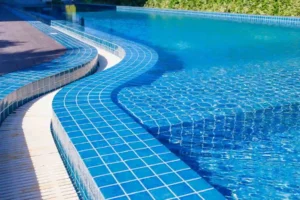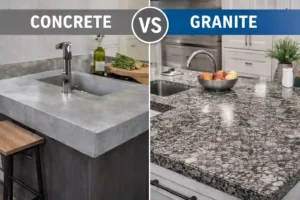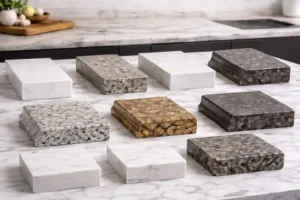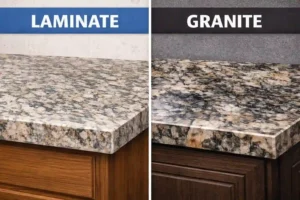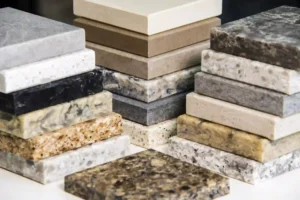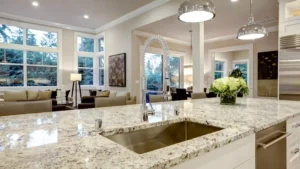How Kitchen Countertop Fabrication Process Works?
The kitchen countertop fabrication process involves several detailed steps to transform raw stone slabs into beautiful, custom countertops. Here’s a breakdown of how it works:
Choosing the Countertop Material
The first step in the fabrication process is selecting the right material for your kitchen countertops. Popular choices include granite, quartz, marble, and other natural or engineered stones. The choice of material depends on factors such as durability, maintenance, color, pattern, and budget.
The good countertop fabricators will help you understand the pros and cons of each material and guide you in making a choice that best fits your kitchen’s style and your lifestyle needs.
Measuring the Kitchen Space
Accurate measurements are crucial in countertop fabrication. Professionals will come to your home to measure your kitchen space precisely, ensuring that the countertops will fit perfectly once installed. They will create a template that reflects the exact dimensions of your countertops, including any cutouts for sinks, cooktops, and other appliances.
This step ensures that the fabricated granite countertops align perfectly with your kitchen’s layout.
Cutting the Stone
Once the material is selected and the template is ready, the countertop fabricators begin the cutting process. The stone slab is cut according to the template using specialized tools like diamond-tipped saws and water jets.
These tools ensure precise cuts, minimizing waste and reducing the risk of cracks or chips. The cutting process also involves creating any necessary openings for sinks, faucets, and appliances.
Shaping and Edging of Stone
After the stone is cut to size, the next step in the countertop fabrication process is that the edges are shaped and according to style. There are various edging options to choose from, such as straight, beveled, bullnose, and ogee, each giving the countertop a different aesthetic.
Moreover, shaping and edging are done with specialized routers and grinders, ensuring that the edges are not only stylish but also safe and comfortable to touch.
Polishing the Surface of Stone
Polishing is the step that brings out the stone’s natural beauty and shine. The surface of the countertop is polished using fine-grit abrasives to achieve a smooth, glossy finish. Depending on the type of stone and desired look, different polishing techniques may be used to create either a glossy or a matte finish. Polishing also helps seal the stone, making it more resistant to stains and scratches.
Final Inspection and Checking of Countertops
Before the countertops are installed, a final inspection is conducted to ensure everything meets the required standards. The countertop fabricators check for any imperfections, ensuring that all edges are smooth, the polish is even, and there are no cracks or chips.
Quality checks also ensure that the countertop fits perfectly according to the template measurements. Once approved, the countertops are ready for delivery and installation in your kitchen.
Types of Countertop Fabrication

When it comes to countertop fabrication, different materials offer unique benefits and characteristics. Two of the most popular materials are granite and quartz, each with its own set of advantages that make them ideal choices for kitchen countertops.
Let’s explore the fabrication processes and benefits of these materials.
Granite Countertop Fabrication
Granite is a natural stone known for its durability and aesthetic appeal. The fabrication of granite countertops involves several key steps, including selecting the stone slab, precise cutting to fit the kitchen layout, and polishing the surface to enhance its natural beauty.
Fabricated granite countertops are custom-made to perfectly match the specific dimensions and style preferences of your kitchen, ensuring both functionality and visual appeal.
Quartz Countertop Fabrication
Quartz countertops are engineered from natural quartz crystals mixed with resins and pigments to create a hard, durable surface. The fabrication process for quartz involves combining these materials under high pressure to create slabs that are cut, shaped, and polished to fit the kitchen’s specifications.
Conclusion
Understanding the countertop fabrication and installation process is crucial for a successful kitchen renovation. Professional services from USA granite countertop fabricators, like SF Marble Granite, ensure precise measurements and a perfect fit.
While choosing experienced fabricators and installers, you avoid issues such as poor fit and damage, ensuring your countertops are both beautiful and durable.
FAQs
What Is Countertop Fabrication?
Countertop fabrication is the process of transforming raw stone materials such as granite, quartz, or marble into custom-designed countertops. This process involves selecting the right material, measuring the space, cutting the stone, shaping and edging, polishing, and conducting a final quality check.
How Do I Choose The Right Countertop Material?
The choice depends on your needs, budget, and design preferences. Granite offers durability and natural beauty; quartz is engineered for consistency and low maintenance; while marble provides a classic, elegant look. A professional fabricator can guide you based on your lifestyle and kitchen requirements.
Why Are Accurate Measurements So Important In Countertop Fabrication?
Precise measurements ensure that the fabricated countertop fits perfectly into your kitchen space. This avoids costly errors, reduces waste, and guarantees that cutouts for sinks and appliances are correctly placed.
What Techniques Are Used To Shape And Edge The Stone?
Specialized routers and grinders are used to shape the stone. There are various edge profiles available, such as straight, beveled, bullnose, and ogee. The choice of edge style enhances the countertop’s safety and visual appeal.
How Long Does The Countertop Fabrication Process Take?
The timeline can vary depending on the project size, complexity of design, and material selected. On average, the process from measurement to installation can take anywhere from a few days to a couple of weeks.


